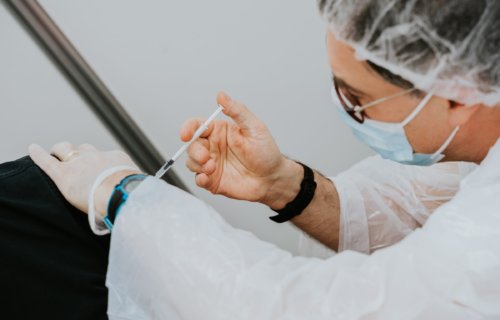BOSTON, Mass. — Timing is everything, especially when it comes to the COVID-19 vaccine, a new study reveals. Researchers from Massachusetts General Hospital say a patient’s antibody response may actually be dependent upon the time of day they receive their vaccination. Moreover, their study finds it’s better to get the shot in the afternoon rather than in the morning.
For people browsing their local pharmacy for daytime and nighttime medicines, many probably think “my cold doesn’t care what time it is!” However, studies find it actually makes a big difference for a number of medications and vaccines. Certain illnesses, like lung disease, also cause more severe symptoms during different times of the day.
In a previous study of older men receiving the annual flu vaccine, the patients displayed higher antibody levels if they received the shot in the morning versus the afternoon. Other trials have revealed that undergoing chemotherapy at certain times of the day leads to the treatment more effectively targeting cancer cells, while also limiting the toxic damage to healthy cells. Although the results are the complete opposite of the flu vaccine study, researchers say time of vaccination appears to matter just as much for the COVID-19 vaccine too.
“Our observational study provides proof of concept that time of day affects immune response to SARS-CoV-2 vaccination, findings that may be relevant for optimizing the vaccine’s efficacy,” says co-senior author Dr. Elizabeth Klerman from MGH’s Division of Neurophysiology, Sleep Unit in a media release.
Later is better when scheduling a COVID shot
The team examined antibody levels among nearly 2,200 British healthcare workers after receiving their COVID vaccinations. Researchers collected blood samples from these hospital workers at the time of vaccination, each of whom received either the Pfizer mRNA vaccine or the AstraZeneca adenoviral vaccine.
Study authors found that antibody responses were higher among participants who received their vaccine later in the day. Antibody levels were also higher among hospital workers receiving the Pfizer shot, women, and younger individuals.
So, why would one vaccine work better in the morning and another work better in the afternoon?
“The SARS-CoV-2 vaccine and the influenza vaccine have different mechanisms of action from each other, and antibody response may vary greatly depending on whether the immune system recognizes the pathogen from earlier infections, such as influenza, or whether it is confronted by a novel virus,” Klerman explains.
Researchers do note that their study did not take into account each participant’s medical history or their sleep and work patterns.
“We need to replicate our findings and develop a better understanding of the underlying physiology of SARS-CoV-2 and the body’s response to vaccination(s) before we can recommend that people who want an extra boost from the vaccine, such as older individuals or those who are immunocompromised, schedule their vaccine for the afternoon,” Klerman adds. “This research is the first step in demonstrating the importance of time-of-day response to SARS-CoV-2 vaccine.”
More info on your vaccine card?
Regardless of when you receive your COVID-19 shot, Klerman says vaccinations are still a critical part of the effort to end the pandemic. The new findings, however, point to the possible need for doctors to start noting the time they administer the vaccine in a patient’s records.
“If preliminary data show a difference in efficacy and adverse effects from a drug or vaccine based on time of day, it would behoove drug companies to administer the drug at the optimal time, which would reduce the number of participants needed to get a statistically significant difference between drug and placebo,” Klerman concludes.
The study appears in the Journal of Biological Rhythms.
